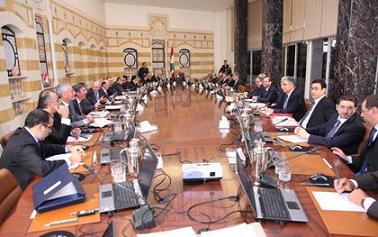The Lebanese cabinet is scheduled to discuss on Thursday a relief plan for immigrants coming from Syria to avert a security and social crisis
The Lebanese cabinet is scheduled to discuss on Thursday a relief plan for immigrants coming from Syria to avert a security and social crisis.
Social Affairs Minister Wael Abou Faour told local newspapers that the plan was discussed by several cabinet ministers during a meeting chaired by Prime Minister Najib Mikati at the Grand Serail on Wednesday.
“Each minister made his own proposal and suggestion on how his ministry is working to resolve the problem of the immigrants,” he said.
“It is up to the government today (Thursday) to take the appropriate decisions” during the session at Baabda Palace, he added.
The session is expected to witness a debate among the ministers over the rising influx of immigrants.
Energy Minister Gibran Bassil, who represents the Free Patriotic Movement in the cabinet, told As Safir daily that Lebanon has reached the stage of “explosion” over the rising number of displaced Syrians and Palestinians.
“If we are going to be accused of racism by seeking to avert an explosion, then we should make that additional sacrifice to preserve the interest of the country,” he said.
The FPM backs the control of the border and not its closure, Bassil stressed.
Minister of State for Administrative Reform Mohammed Fneish said the issue of the immigrants should be dealt with on humanitarian grounds without ignoring the security and social repercussions of the increasing number of refugees.
“The relief aid will be very costly and we will discuss in the cabinet the state's ability to afford it,” he told As Safir.
An Nahar daily, which received a copy of the plan's summary, said the number of officially registered immigrants in Syria has reached 150,000 while around 50,000 are still not registered. There are estimates that the number of displaced could reach at least 300,000 in the next six months.
The plan aims at providing state institutions involved in the relief aid with 320,276,000 dollars despite the inability of the government to meet that end, An Nahar said.
